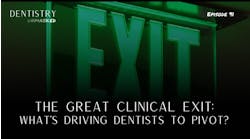If you own a growing dental practice, you’ve probably heard from a dental service organization (DSO) representative who expressed interest in buying your business. Whether you’re thinking about selling now or keeping the option in mind for the future, you may be wondering what’s behind a DSO’s interest in your practice.
Why are they contacting you? What information will they need about your practice? Most important, what kind of offer can you expect from a DSO? Look at these insights before you sign on the dotted line. I have years of experience in the dental industry, including extensive work with some of the largest groups in the country, and here’s how you can understand and work with a DSO.
How DSOs target dental practices
DSOs typically target practices for acquisition via passive and proactive marketing. In other words, they reach out by sending flyers and postcards, referrals, or making cold calls. Some have been known to call offices after hours to acquire doctor’s personal phone numbers. They may also find a practice by reviewing “Best of” issues from local and trade publications. If a DSO rep decides your practice meets their criteria, they’ll dig deeper, often by analyzing your website.
Through your online presence, DSO reps learn things such as how many doctors and supporting staff are in the practice. DSOs often use this information to determine your estimated financial position before moving to the next phase, which is to contact you to validate their conclusions.
Related articles
DSOs: The devil is in the details
How selling to a DSO is different from selling to a dentist
For example, they may assume that a cosmetic dentistry practice with two doctors generates at least $2 million in collections, whereas a solo practitioner with seven employees might generate about $1.2 million. DSOs compare what they see on your website against their criteria—not just how much you collect annually, but also the size of your practice.
If your practice meets their criteria (which varies from DSO to DSO), the rep will contact you for more information. They’ll want to validate their assumptions about your practice size and revenue. They’ll ask what your annual collections are, your PPO/Medicaid/fee-for-service ratios, and how many operatories you have. Then they’ll decide whether to go to the next step.
What to expect from a DSO offer
If your answers match the DSO’s specifications, they’ll typically offer to conduct an in-house valuation of your practice. Remember that a DSO exploring your practice is by definition an interested party in the sale. Ask yourself: if you were selling your house, would you accept an appraisal from someone who would benefit from buying the house at a lower value than it’s worth?
You wouldn’t accept that appraisal on a house, and you should also look for maximum value for your practice. DSOs know this, which is why they often provide a verbal offer that’s designed to blow you away. But the devil is in the details, so it pays to examine the terms closely. Will the verbal offer hold up firmly during the due diligence process, or will the DSO have the opportunity to lower it?
Are the multiples the DSO is using to calculate the offer (for example, 10 times EBITDA [earnings before interest, taxes, depreciation, and amortization]) applicable to your practice, or are strings attached related to hidden factors, such as equity? The DSO will likely go for positive shock value with the verbal offer—they’ll want a figure that far outstrips offers you may have heard about from colleagues. They think this is good business.
But does this approach make good business sense for you? Dental practice owners are in a better position to maximize practice value when they have a realistic idea of that value and a comprehensive understanding of the pros and cons of an offer.
Red flags
Doctors who are entertaining offers from DSOs should look for red flags, and the first is: does the offer seem too good to be true? If so, proceed with caution. To fully understand the offer, ask the DSO rep for a list of doctors with whom they’ve completed transactions—ideally 30-, 60-, or 90-days post-transaction—so you can chat with those dentists.
The list the DSO provides (and what you hear from the doctors) can provide significant insights. It’s definitely a red flag if they’re reluctant to provide references from doctors who’ve sold their practice, if they provide a limited number of doctors, or if the people you talk with are not satisfied.
It's a good idea to analyze elements of the offer such as the noncompete clause, the level of equity you’ll receive, and what projections look like. Do the terms seem reasonable? Evaluating productivity terms is also critical. Will the practice have to keep growing for you to receive the full package? Are you required to stay for a certain number of years before stepping away? It’s important to have solid answers to all these questions and to consider all options.
There are different ways to value a practice and a multitude of options when structuring a purchase deal. These include a joint venture structure where you maintain equity and ownership within the practice, equity rolls where you can roll some of your equity into the holding corporation, and acquisitions where you sell 100% of the practice and become an employee. It is important to fully comprehend the details of the offer as it’s possible to get stuck in a situation that resembles a reverse mortgage, where you relinquish equity upfront in exchange for regular payments from the DSO. Watch out! This predatory practice yields less money for you over time.
How to ensure maximum value
A DSO working directly with a doctor really wants to understand how much a doctor is willing to sell for. It’s not in the DSO’s best interest to optimize value for the doctor, but rather to meet the amount needed to satisfy the doctor’s wants and get them to sign the dotted line. DSOs can typically buy at a lower price than the actual value of the practice because there isn’t competition in most of these deals.
If this is your only offer on the table, do your due diligence by taking the practice to market to understand what the market bears and to compare the offers you receive. If you’re thinking about selling, the best way to maximize value is to put yourself in a competitive environment.
In one real-world scenario, a practice with $2.5 million in collections received an initial offer of $4 million in a joint venture-only agreement. The dentist talked to a dental practice broker to explore other options. The broker provided a prospectus/valuation—without the $5,000 to $10,000 contract most firms or valuation companies require for that service—and brought the opportunity to market.
Working with the broker exposed the practice owner to more potential buyers, putting him in a better and more competitive environment. The dentist eventually entered a joint venture/equity roll deal that resulted in an enterprise value of nearly $8 million with the same DSO that had originally offered $4 million.
DSOs are interested in maximizing the value they receive from a transaction. Thankfully, with hundreds of DSOs in the market, it’s not one-size-fits-all anymore. But in all cases, look out for your own interests by working with expert partners who have no incentive to sell your practice short but rather a commitment to maximizing the value you receive.
When it’s time to explore a practice transition, remember this look insidethe mind of a DSO. Make sure you fully understand the market potential of your practice, the terms of any offer, and the various options available to you. This way you’ll be comfortable with your decision and you’ll secure your peace of mind.Editor's note: This article appeared in the February 2023 print edition of Dental Economics magazine. Dentists in North America are eligible for a complimentary print subscription. Sign up here.







